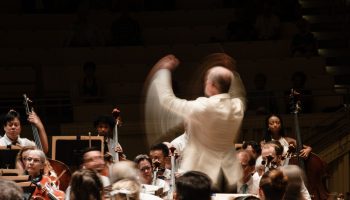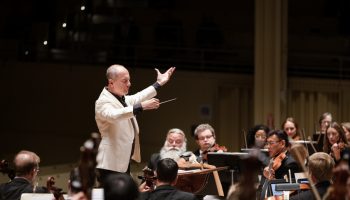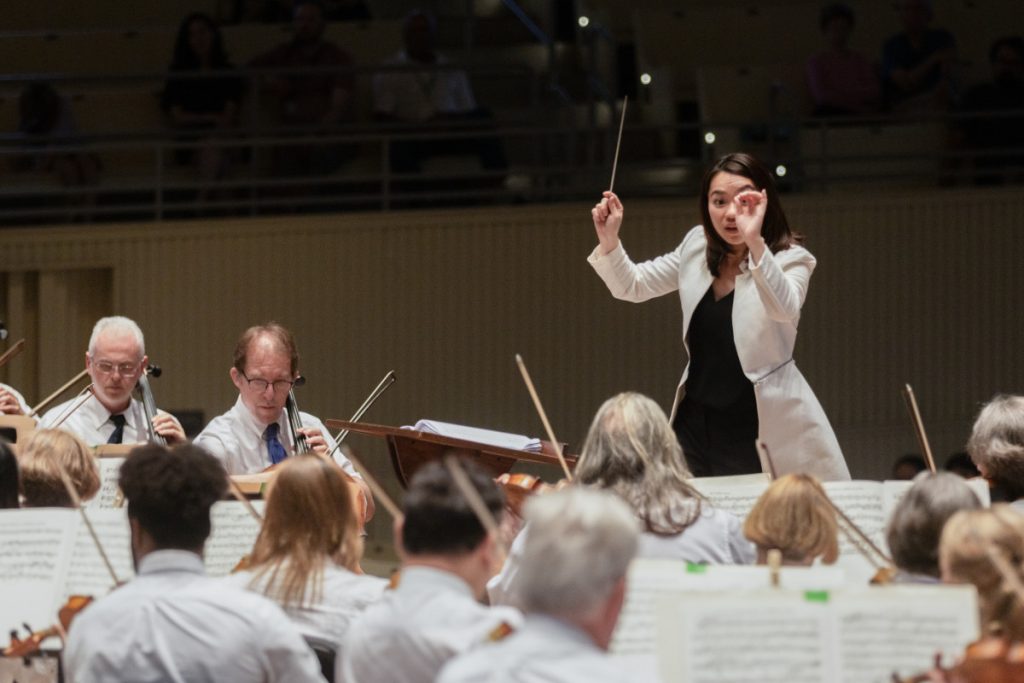
Chia-Hsuan Lin guest conducts the Chautauqua Symphony Orchestra Tuesday in the Amphitheater.
The Chautauqua Symphony Orchestra can plumb the depths of profound compositions. Likewise, an accomplished conductor such as Chia-Hsuan Lin can handle complex masterpieces. But sometimes, the night calls for breezy and diverting music, directed in a straightforward manner — the type of entertainment you’d expect from a summer festival. Tuesday night, the CSO offered just that at the Amphitheater with a lovely program anchored by Dvořák’s mercurial Symphony No. 8.
The concert opened with Samuel Coleridge-Taylor’s “Petite Suite de Concert.” Written in 1911, it teems with neoclassical theme and Romantic strains amid masterful orchestration. The musicians responded to Lin’s crisp cues with excellent ensemble that allowed the piece’s many shifts from delicate to robust sections. No more is this the case than in the second movement, “Demande et réponse.” The violins offered a gossamer phrasing of the opening melody that was met by warm and friendly response by the full orchestra before returning even richer. The third movement, “Un sonnet d’amour,” found the violins in full Romantic mode with a burnished timbre. Throughout it, the winds and percussion were lively even when providing a backdrop. After a short piece, “The Angel from Formosa,” by Taiwanese composer Tyzen Hsiao, brought a folk-like, impassioned melody to the stage, it was time for the main course.
Dvořák’s Symphony No. 8 is deceptively difficult to conduct. One needs to not only keep the momentum through numerous shifts in mood and mode, but also restrain the orchestra from galloping through the eminently playable music. Aided by textbook form, Lin did so. The cellos certainly benefited as they crafted the bittersweet intro and the stately finale theme with burnished tone. But the entire CSO profited from Lin’s direction, from the violins’ beguiling rendition of the third movement’s lilting theme to the brass punches and horn whoops, from the exquisite trumpets to the blooming woodwinds, and from a graceful concertmaster solo to several dainty
flute touches.
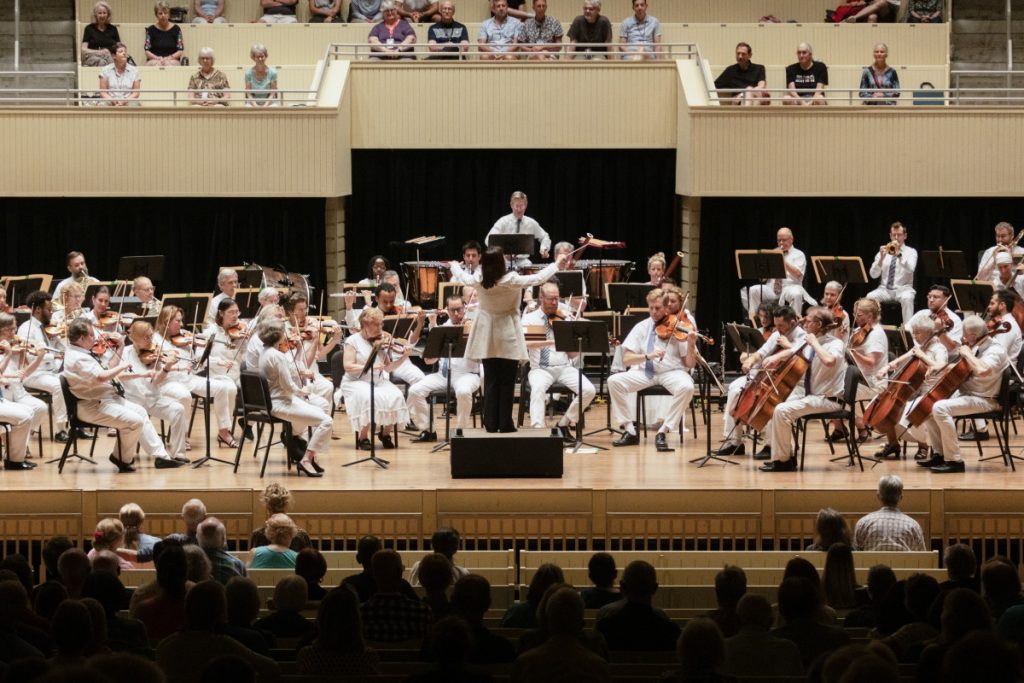
Chia-Hsuan Lin guest conducts the Chautauqua Symphony Orchestra Tuesday in the Amphitheater.
Chamber in a genre all its own
Apparently, the signs dotting the Institution grounds stating “Turn It Towards the Turtle” were not a guerilla marketing campaign for the chamber music concert in Elizabeth S. Lenna Hall Monday afternoon. No matter, the auditorium was packed for the appearance of the glorious anomaly that is the Turtle Island String Quartet.
When it debuted in 1985, no one knew what to make of a group of four classically trained string players who favored bebop over Beethoven and Hendrix over Haydn. Back then, music labels forced musicians and composers into genres like animals in pens. In what section should a record store put Turtle Island? Jazz? Classical? Rock? Latin? World?
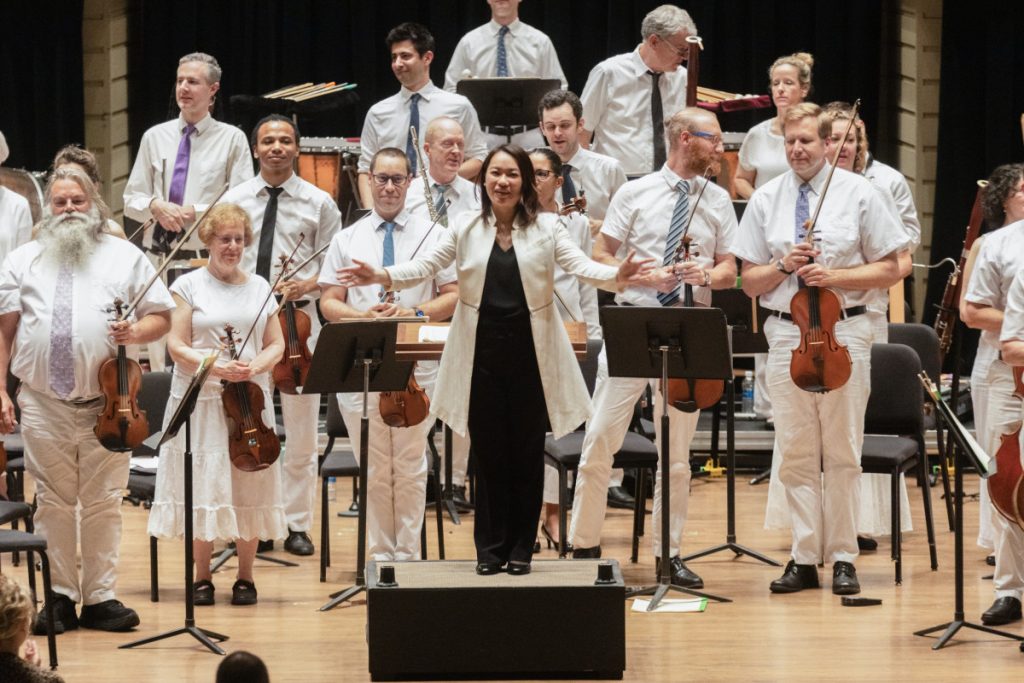
Chia-Hsuan Lin guest conducts the Chautauqua Symphony Orchestra Tuesday in the Amphitheater.
Nearly 40 years later in a world long-since tired of labeling, the group is in a genre of one. It now often performs its own music rather than arranged standards. In fact, about half the program Monday featured works by co-founder and violinist David Balakrishnan: fiery pieces full of exhilarating runs, crunchy harmonies and freeing improvisation. The opener, his “Little Mouse Jumps” wonderfully transforms a snippet of Bach’s famous Badinerie, transposed from the flute. From then came a parade of traditions, including bluegrass, rock and perhaps bossa nova. For the latter, Naseem Alatrash’s cello turned into a double bass, amply providing the repeating underpinning. Balakrishnan’s “Island Prayers” and “Darkness Dreaming” were just as engaging. Several commissioned pieces rounded out the affair. Rhiannon Giddens’ “Pompey Ran Away” explored fiddle playing, Jerod Impichchaachaaha’ Tate’s “Little Loksi” was a playful imagining of a children’s book and Terence Blanchard’s rhapsodic “Turtle Trajectory” juxtaposed classical with improv.
Andrew Druckenbrod is a former classical music critic of the Pittsburgh Post-Gazette. He studied musicology at the University of Minnesota and is an adjunct professor at the University of Pittsburgh.



